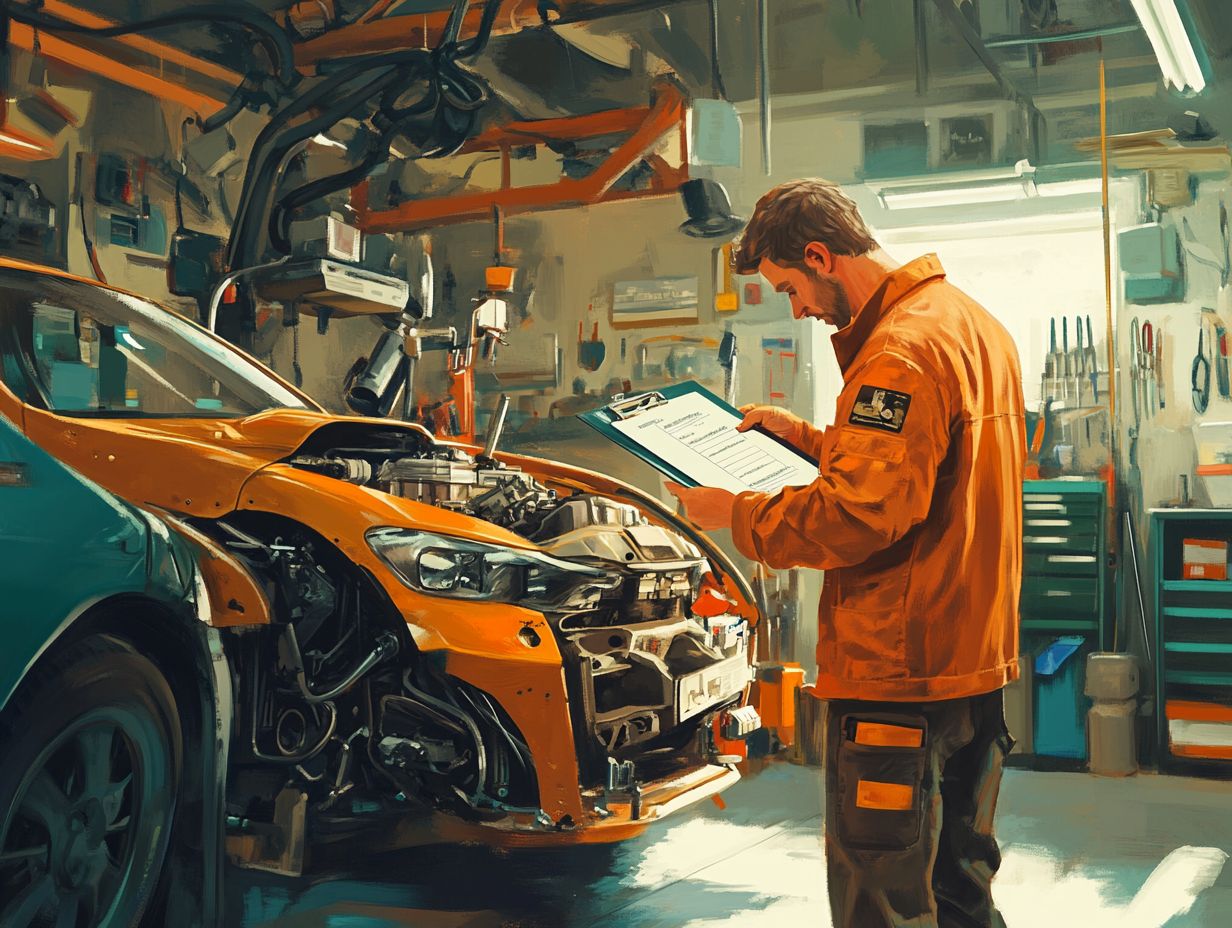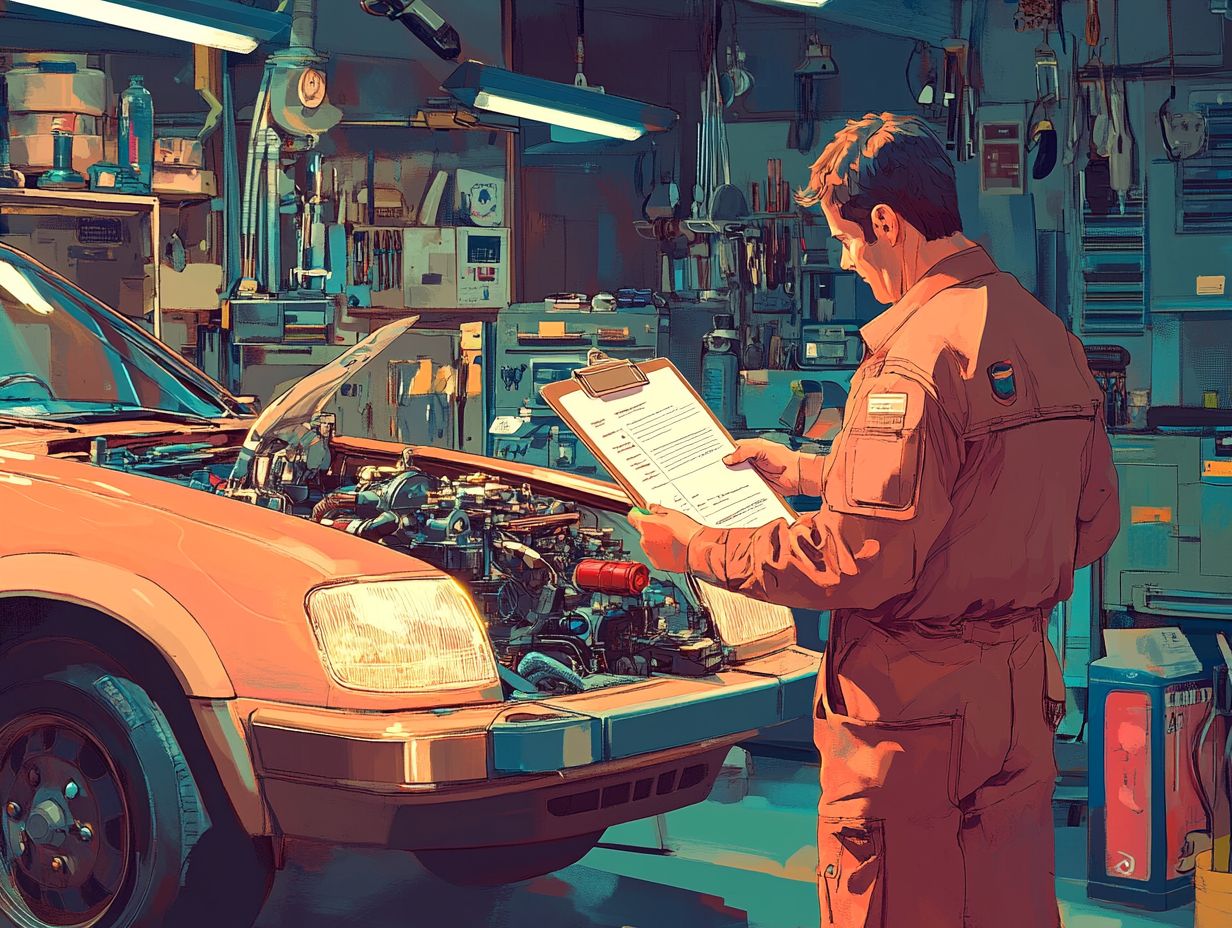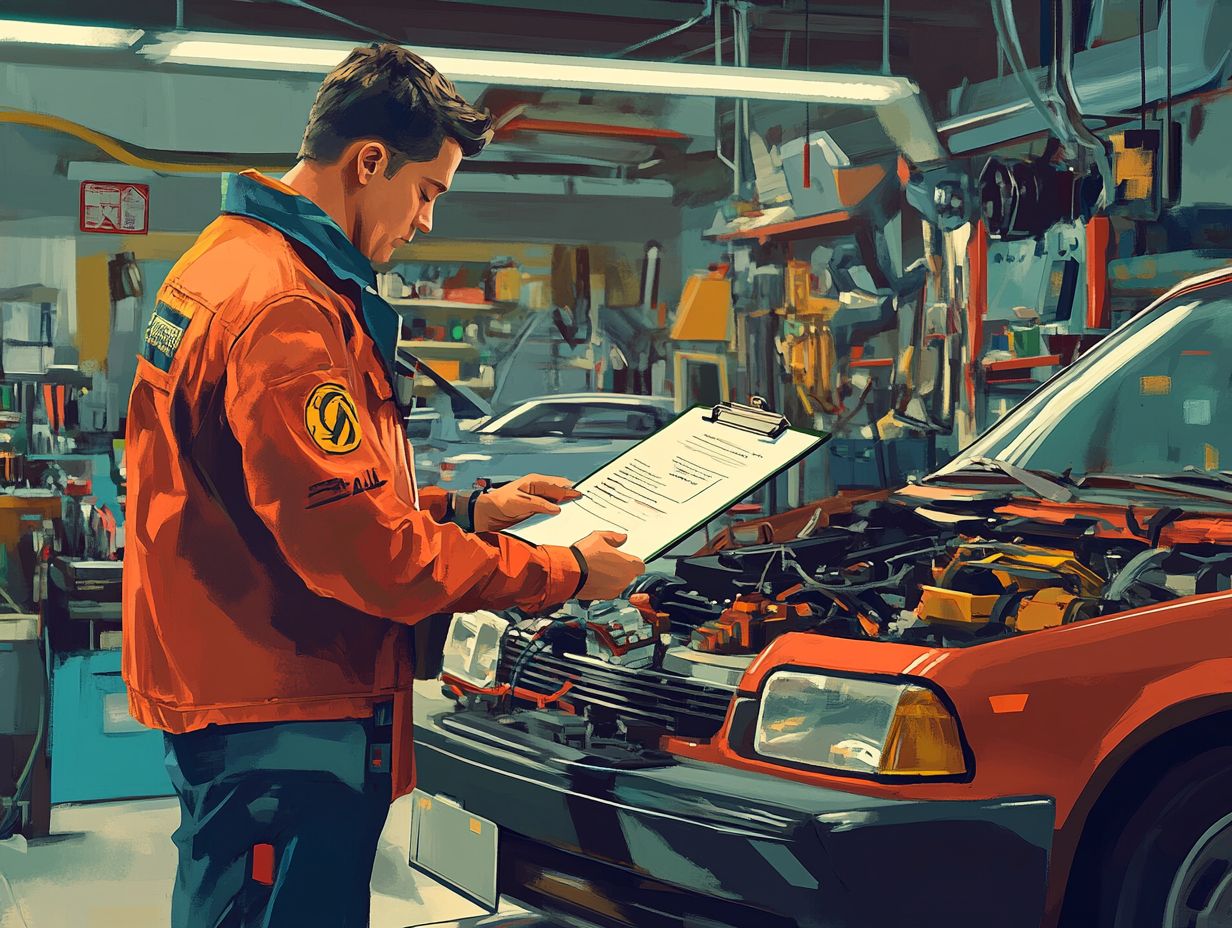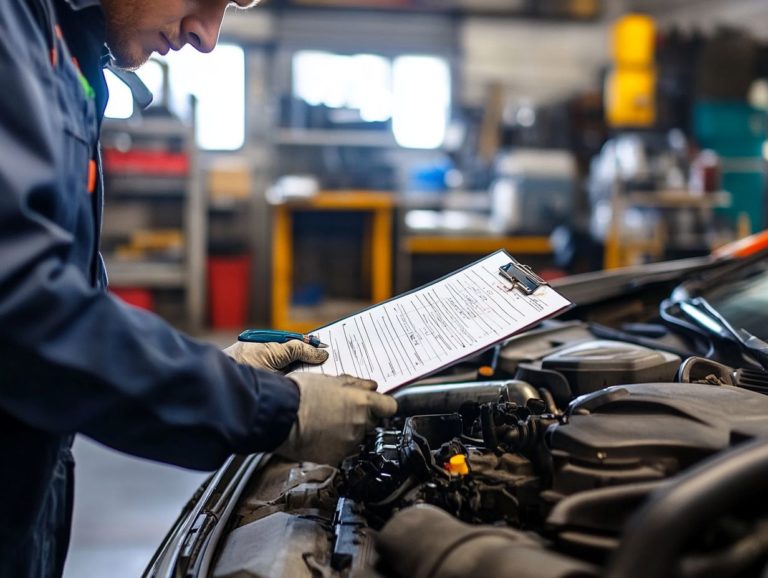Essential Factors Influencing Car Inspection Outcomes
Car inspections are essential for ensuring both the safety and functionality of your vehicle. Don’t wait until it’s too late!
By committing to regular inspections, you can spot potential issues before they escalate and ensure compliance with important regulations. This discussion dives into the significance of thorough car inspections, factors influencing their outcomes, common reasons for inspection failures, and key tips to prepare your vehicle effectively.
Whether you re a seasoned driver or a new car owner, understanding these aspects can save you valuable time and money while keeping you safe on the road.
Contents
- Key Takeaways
- Importance of Proper Car Inspections
- Factors that Influence Car Inspection Outcomes
- Common Car Inspection Failures
- Tips for Passing a Car Inspection
- Frequently Asked Questions
- What factors influence car inspection results?
- How does vehicle maintenance affect car inspection outcomes?
- Does the age and mileage of a car play a role in car inspection outcomes?
- Can the type of fuel used in a car affect its inspection outcomes?
- How do geographic location and weather conditions influence car inspection outcomes?
- Do driving habits impact car inspection outcomes?
Key Takeaways

Car inspections are crucial for ensuring vehicle safety and functionality. The age, condition, and environmental factors can greatly influence the outcome of a car inspection. To enhance your experience, it’s important to know how to make the most of your car inspection, as understanding inspection standards and regulations, and properly preparing your vehicle can help increase the chances of passing an inspection.
What is a Car Inspection?
A car inspection is a detailed evaluation of how well your vehicle works and its safety. It ensures that your vehicle meets standards set by the Department of Transportation (DOT) and follows essential safety regulations.
This process typically involves a thorough examination of various mechanical components and the overall condition of your car for road readiness. Regular inspections are vital, especially for commercial vehicles, which have stricter requirements due to frequent use.
There are different types of inspections available:
- Level I: A comprehensive examination of the entire vehicle.
- Level II: Focuses on specific components like brakes or tires.
Once the inspection is complete, detailed reports document the condition of each component and highlight necessary repairs. These reports not only ensure compliance with safety standards but also help you maintain operational efficiency. This ultimately enhances road safety for everyone.
Importance of Proper Car Inspections
Proper car inspections are vital for maintaining your vehicle’s safety and functionality. Knowing what to look for in a car inspection can greatly enhance your overall driving experience and contribute to road safety.
By scheduling regular inspections, you can uncover potential defects early and ensure that your vehicle complies with safety regulations. This proactive approach reduces the risk of accidents caused by mechanical failures, allowing you to drive with confidence.
Ensuring Vehicle Safety and Functionality
Ensuring vehicle safety and functionality is crucial for you as a driver or logistics provider. It directly influences road safety and your confidence behind the wheel.
By implementing a thorough inspection process and conducting regular safety checks, you can identify potential issues before they become serious problems.
During these inspections, professionals examine critical components like brakes, tires, and lighting systems. They ensure that everything meets established safety standards and use diagnostic tools to assess vehicle functionality. This includes evaluating engine health and electrical systems, which are vital for optimal performance.
A comprehensive review of fluid levels, such as oil and coolant, is also essential to prevent breakdowns while you’re on the road. Maintaining a proactive approach with these checks significantly reduces the likelihood of accidents, safeguarding not just yourself but all other road users as well.
Factors that Influence Car Inspection Outcomes
Several factors can impact the outcomes of car inspections, including the vehicle’s age, overall condition, and understanding the car inspection process and compliance with established inspection standards.
Recognizing these elements is crucial for vehicle owners and logistics providers who want to ensure compliance and avoid potential inspection violations.
Schedule your next car inspection today to keep your vehicle in top shape!
Vehicle Age and Condition

Your vehicle’s age and condition are key factors in inspection outcomes. To ensure they are safe to drive, older vehicles often need more frequent checks, along with the right essential tools for a car inspection.
As car parts age, they experience wear and tear that can affect performance and safety. Issues like reduced braking power or failing emissions tests highlight the need for proactive maintenance.
Keeping a detailed maintenance history is important. It helps inspectors understand your vehicle’s reliability and condition, increasing your chances for a successful inspection.
Environmental Factors
Environmental factors like weather and road conditions can influence car inspections. Understanding how weather affects car inspections is crucial, as harsh conditions can create safety hazards that may be discovered during inspections.
For instance, temperature changes can cause car parts to expand and contract, leading to leaks. High humidity speeds up rust, especially in vital systems like brakes.
Navigating tough terrains, like rocky roads, puts stress on your suspension and steering. Regular inspections become crucial to maintain safety.
Addressing these environmental challenges now will enhance your vehicle’s safety and reliability.
Inspection Standards and Regulations
Inspection standards set by the Department of Transportation (DOT) ensure vehicle safety. Following these rules means your vehicle meets safety requirements and operates well on the road.
These standards include checks on emissions, brakes, and structural integrity to protect both drivers and pedestrians. The DOT and local agencies enforce these standards through regular audits.
Other organizations create guidelines for inspections, making sure the process stays thorough and fair.
By routinely updating these standards, agencies aim to lower accident rates and improve road safety for everyone.
Common Car Inspection Failures
Knowing common car inspection failures is vital for drivers and logistics providers. It helps you avoid violations and prioritize safety.
Mechanical issues often lead to failed inspections, underscoring the need for regular maintenance. This proactive approach boosts your vehicle’s performance and promotes a safer driving environment for all.
Top Reasons for Failing Inspections
Top reasons for failing inspections often stem from mechanical failures, vehicle defects, and noncompliance with safety regulations. Common issues like faulty brakes, worn tires, and engine malfunctions frequently result in inspection violations. This underscores the very important role of proactive vehicle maintenance.
Don t forget to check parts like lights that aren’t working, inadequate windshield wipers, and misaligned frames. These issues can also hinder your vehicle’s ability to pass mandated assessments.
Each problem arises from a lack of routine checks, which can compromise both safety and performance. Emission problems can lead to serious issues, resulting in costly penalties for ignoring regulations.
By staying informed about these frequent failures, you help maintain your vehicle’s integrity and ensure compliance with regional regulatory standards.
Tips for Passing a Car Inspection

Successfully navigating a car inspection requires careful preparation and attention to inspection requirements. Ensure your vehicle meets all necessary standards.
Implement a well-structured maintenance schedule and conduct thorough pre-trip inspections. This can greatly enhance your chances of passing the inspection on your first try.
Preparing Your Vehicle for Inspection
Preparing your vehicle for inspection means understanding the specific requirements and conducting vital pre-trip inspections. These steps help catch potential issues ahead of time.
A well-documented maintenance history and regular safety checks can greatly facilitate a seamless inspection process.
- First, familiarize yourself with the inspection criteria set by your local authorities; these can differ from one region to another.
- Next, prioritize examining key components such as brakes, lights, tires, and fluid levels, as these are essential for overall safety.
Reviewing past maintenance records will shed light on previous repairs and help identify areas needing more attention. Schedule your maintenance checks early to avoid surprises!
By prioritizing these steps, you ll significantly boost your confidence in your vehicle’s performance and the inspection outcome.
Understanding Inspection Requirements
Understanding inspection requirements is essential for ensuring compliance with DOT regulations and successfully passing vehicle inspections. Familiarize yourself with the necessary documentation and safety regulations to streamline the inspection process.
As a vehicle owner, pay close attention to various inspection criteria, including brakes, lights, and tire conditions. Failing to meet these standards could lead to costly fines or unwanted downtime.
Maintaining thorough inspection reports is crucial as they serve as proof of compliance and can be invaluable during roadside checks. Being well-versed in state-specific regulations ensures that your vehicles meet federal standards and comply with local mandates.
This proactive approach safeguards public safety and helps build a strong reputation in the industry.
Frequently Asked Questions
What factors influence car inspection results?
Factors that can influence car inspection results include vehicle maintenance, the age and mileage of the car, type of fuel, geographic location, weather conditions, and essential factors in a comprehensive car inspection, such as driving habits.
How does vehicle maintenance affect car inspection outcomes?

Regular vehicle maintenance, such as oil changes, tire rotations, and brake checks, can greatly impact car inspection outcomes. Following the best practices for a car inspection, a well-maintained car is more likely to pass an inspection compared to a poorly maintained one.
Does the age and mileage of a car play a role in car inspection outcomes?
Yes, the age and mileage of a car can significantly impact inspection results. Before proceeding, it’s important to consider the essential questions to ask before car inspection. Older cars with high mileage tend to have more wear and tear, making it challenging to meet inspection standards.
Can the type of fuel used in a car affect its inspection outcomes?
Yes, the type of fuel can impact inspection results. Some states enforce stricter emissions rules for diesel vehicles, so always use the recommended fuel for your car.
How do geographic location and weather conditions influence car inspection outcomes?
Geographic location and weather can greatly affect inspection results. Cars exposed to extreme weather, like intense heat or cold, often show more wear, which can impact their value, as detailed in the impact of a poor inspection on car value, making inspections tougher.
Do driving habits impact car inspection outcomes?
Yes, driving habits do affect inspection outcomes. Aggressive driving, like frequent speeding or abrupt braking, increases wear on a car, making it harder to pass inspections.
Practicing safe and responsible driving is essential to keep your car in good shape.
Keeping your car in top condition is key. Stay proactive to avoid surprises during inspections!





